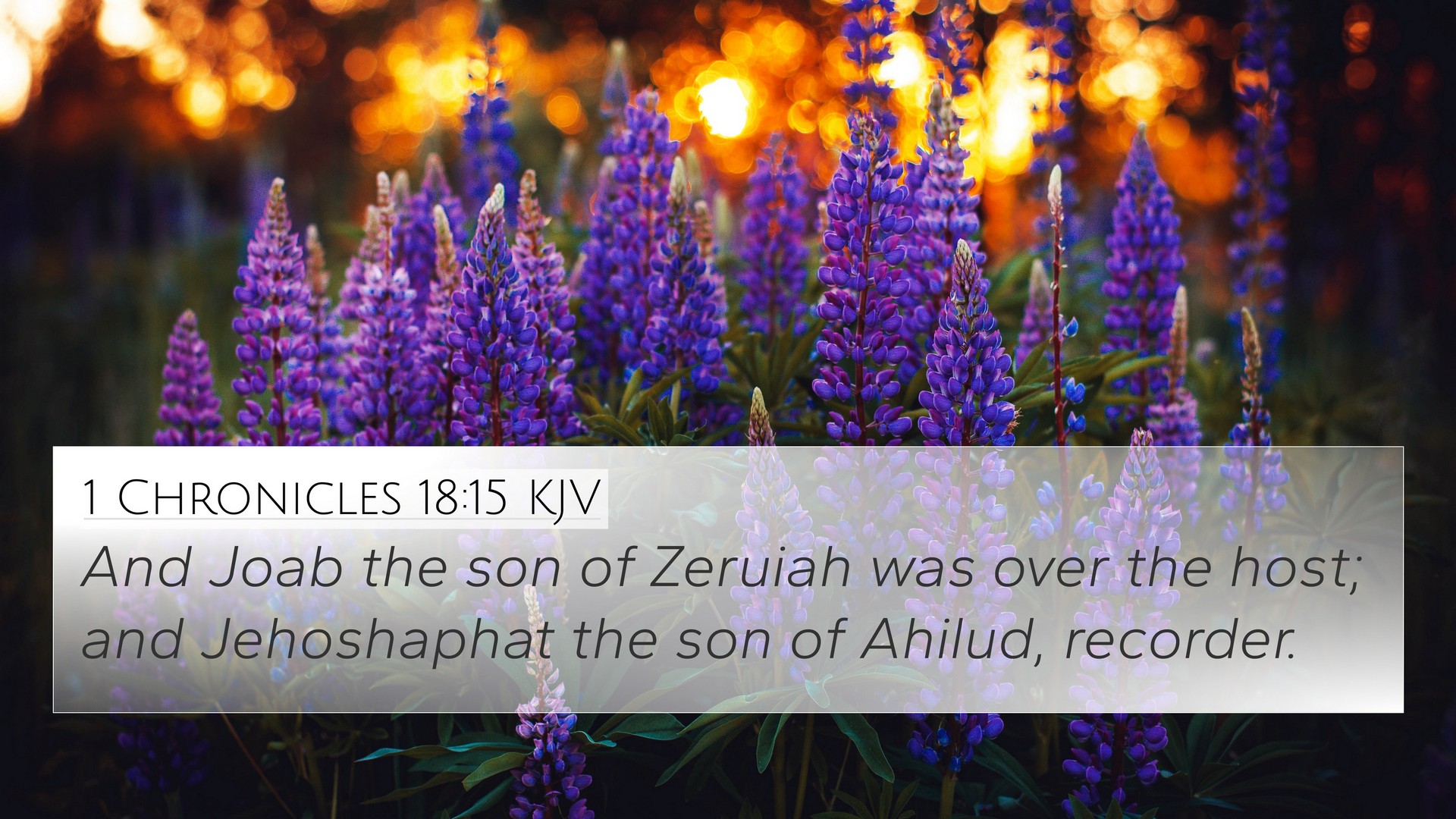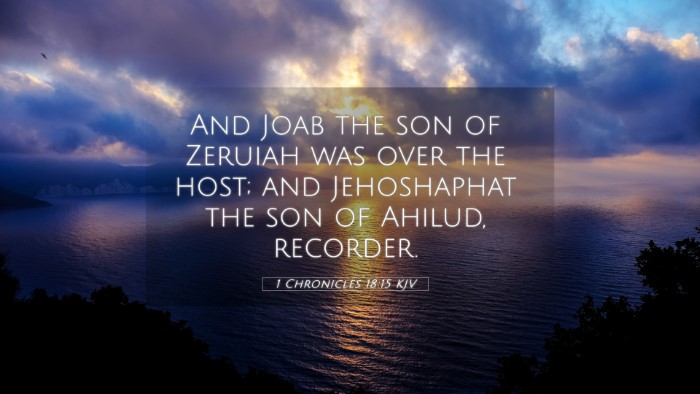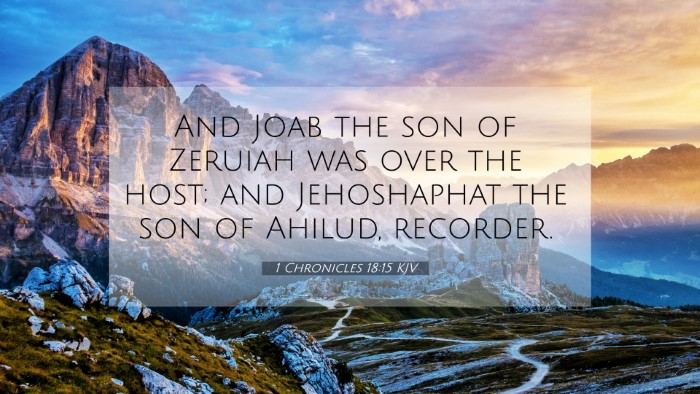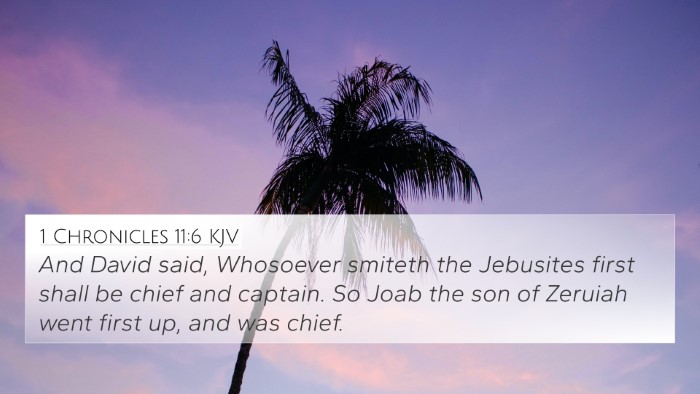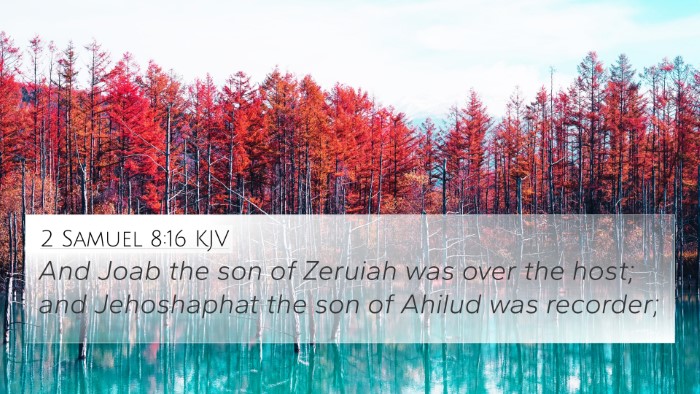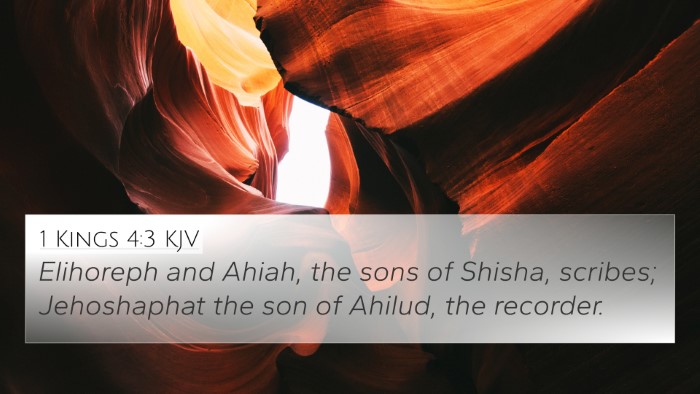Understanding 1 Chronicles 18:15
1 Chronicles 18:15 states: "And Joab the son of Zeruiah was over the host; and Jehoshaphat the son of Ahilud, recorder." This verse gives a brief insight into the administration of King David's army and the roles of key figures in his reign.
Commentary Insights
This verse, while seemingly straightforward, opens up significant discussions regarding the leadership and governance structure of David's kingdom as expounded by biblical commentators.
Matthew Henry's Commentary
Matthew Henry points out that Joab, as the commander over the host, exemplifies a warrior's role within Israel's military structure. Henry emphasizes the importance of Joab's experience and his often complex relationship with King David, noting how his leadership was both effective and fraught with personal conflicts.
Furthermore, Henry discusses the role of Jehoshaphat, highlighting the significance of having a recorder—a position akin to that of a historian or chronicler, which was essential for maintaining an accurate record of military campaigns and governmental affairs.
Albert Barnes' Notes
Albert Barnes elaborates on the role of Joab, suggesting that his military leadership was crucial during a time when Israel faced various challenges. Barnes argues that Joab's character is multidimensional, depicting both loyalty and ambition, which ultimately influenced the broader narrative of King David's reign.
Concerning Jehoshaphat, Barnes notes how the role of recorder not only implies maintaining records but also suggests a level of accountability in governance, which was important for future generations to understand the actions taken during David’s reign.
Adam Clarke's Commentary
Adam Clarke provides insights into the military composition of Israel under David, discussing the strategic importance of having a capable leader like Joab to oversee the forces. Clarke points out that the mention of these officials within Chronicles likely served to reaffirm David's established order and encourage the Israelites of their divine leadership during the tumultuous periods of their history.
Clarke further reflects on the spiritual implications of establishing documentation of events, connecting it with God's providence in guiding His people throughout their history.
Cross-References and Thematic Connections
To gain a fuller understanding of 1 Chronicles 18:15, we can explore several cross-references that highlight related themes and characters:
- 2 Samuel 8:16 - This passage gives a parallel account of Joab's leadership and mentions the same recorder, emphasizing continuity in David's reign.
- 1 Chronicles 11:6 - Joab's decisive actions during the conquest of Jerusalem demonstrate his military prowess.
- 2 Samuel 20:23 - A further exploration of Joab's complex character and his role among David's military leaders.
- 1 Chronicles 28:1 - Expounds on the assembly of the leaders in Israel, linking Jehoshaphat's role to broader governance.
- 1 Samuel 14:52 - Provides insights into the longstanding conflicts in Israel and supports the need for strong military leadership.
- 2 Samuel 23:8-39 - Discusses David's mighty men, reinforcing Joab’s significance within that elite circle.
- 2 Samuel 8:15-18 - Gives context to David's administration and how operational leaders like Joab contributed to its success.
- 1 Chronicles 19:11 - Reflects on military strategies, offering more understanding of Joab's role as a commander.
- 1 Kings 2:5-6 - Joab’s eventual downfall further complicates his legacy and connects deeply with the themes of leadership and accountability.
- Nehemiah 12:11 - References historical figures in Israel's history that shed light on the evolution of record-keeping in governance.
Thematic Analysis and Conclusive Thoughts
The central themes drawn from 1 Chronicles 18:15 through these commentaries and cross-references indicate the significance of leadership, accountability, and governance in Israel’s historical narrative. The compatibility of Joab’s martial prowess with Jehoshaphat’s administrative role lays a foundation for understanding the complexities of David’s reign.
In exploring this verse, we also observe how these figures interacted, thus providing a deeper understanding of Biblical leadership dynamics, which extends to applying similar insights into modern contexts of governance and accountability.
Cross-Referencing as a Tool for Bible Study
Using cross-references to interpret 1 Chronicles 18:15 provides a rich theological and historical context. For scholars and laypeople alike, engaging with these themes through cross-referencing Biblical texts enhances understanding and fosters deeper connections across scripture. Writing and preaching grounded in comprehensive Bible cross-reference materials can illuminate key aspects of faith and practice, allowing for a more intricate tapestry of scriptural engagement.
Resources for Cross-Referencing
To effectively study scripture with tools for Bible cross-referencing, one may find the following beneficial:
- Bible concordances to find related verses.
- Bible cross-reference guides for quick access to similar themes.
- Cross-reference Bible study methods that empower individual and group study.
- Comprehensive Bible cross-reference materials to bolster knowledge and context.
